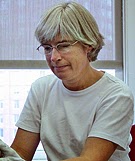Science on Tap
Thursday, May 1, 2014
5:30 pm - 6:30 pm
New Location!
Chama River Brewing Company
4939 Pan American Freeway
505 342.1800
Project Plowshare
The Peaceful Use of Nuclear Explosives in Cold War America
Scott Kaufman
Professor of History
Francis Marion University
Dr. Kaufman, a Francis Marion University Board of Trustees Research Scholar, joined the Francis Marion University staff in 2001. He is the author or co-author of over a half-dozen books on diplomatic, presidential, and military history, the most recent of which is Project Plowshare: The Peaceful Use of Nuclear Explosives in Cold War America (Cornell University Press, 2013); He is currently editing The Companion to Gerald R. Ford and Jimmy Carter, to be published by Wiley-Blackwell, and working on both a biography of Gerald R. Ford and a manuscript on the environment and international diplomacy.
At this seminar, Dr Kaufman will talk about his book. Inspired by President Dwight D. Eisenhower's "Atoms for Peace" speech, scientists at the Atomic Energy Commission and the University of California's Radiation Laboratory began in 1957 a program they called Plowshare. Joined by like-minded government officials, scientists, and business leaders, champions of "peaceful nuclear explosions" maintained that they could create new elements and isotopes for general use, build storage facilities for water or fuel, mine ores, increase oil and natural gas production, generate heat for power production, and construct roads, harbors, and canals. By harnessing the power of the atom for nonmilitary purposes, Plowshare backers expected to protect American security, defend U.S. legitimacy and prestige, and ensure access to energy resources.
Scott Kaufman’s extensive research in nearly two dozen archives in three nations shows how science, politics, and environmentalism converged to shape the lasting conflict over the use of nuclear technology. Indeed, despite technological and strategic promise, Plowshare’s early champions soon found themselves facing a vocal and powerful coalition of federal and state officials, scientists, industrialists, environmentalists, and average citizens. Skeptical politicians, domestic and international pressure to stop nuclear testing, and a lack of government funding severely restricted the program. By the mid-1970s, Plowshare was, in the words of one government official, “dead as a doornail.” However, the thought of using the atom for peaceful purposes remains alive.




